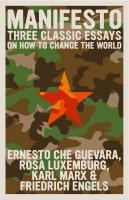"For a new generation of activists, these are classic revolutionary writings by four famous rebels, including The Communist Manifesto (1848) by Karl Marx and Friedrich Engels; Reform or Revolution (1899) by Rosa Luxemburg; and Che Guevara's Socialism and Man in Cuba (1965). Includes an introduction by Cuban Marxist intellectual Armando Hart and a preface by the great radical feminist American poet Adrienne Rich. All the essays in this book were written by relatively young people-Marx when he was thirty and Engels at twenty-eight, Rosa Luxemburg at twenty-seven, Che Guevara as the eldest at the ripe old age of thirty-seven. Born into different historical moments and different generations, they shared an energy of hope, an engagement with history, a belief that critical thinking must inform action, and a passion for the world and its human possibilities"--

